Episode 10: Finding Community at a Predominantly White University
Celiana Lopez, Gisselle Cambron, and Yami Rodriguez are three students at Loyola University Chicago. Attending a predominantly white institution, or PWI, has presented challenges to all three girls, but Celiana, Gisselle, and Yami have found joy and community in Lambda Theta Alpha, their Latina sorority, and in programs meant to support first generation and low income students like Loyola’s Achieving College Excellence program.
In this episode, reporter Gina Castro meets the three friends and digs into what it’s like to be a Latina at a PWI. Researchers from the Latino Policy Forum also unpack new research about obstacles to Latinas’ success in college.

Celiana Luz López, 20, a student of Loyola University, poses for a portrait on campus in front of Lake Michigan. Chicago, IL, November 6, 2023 Photo by Samantha Friend Cabrera
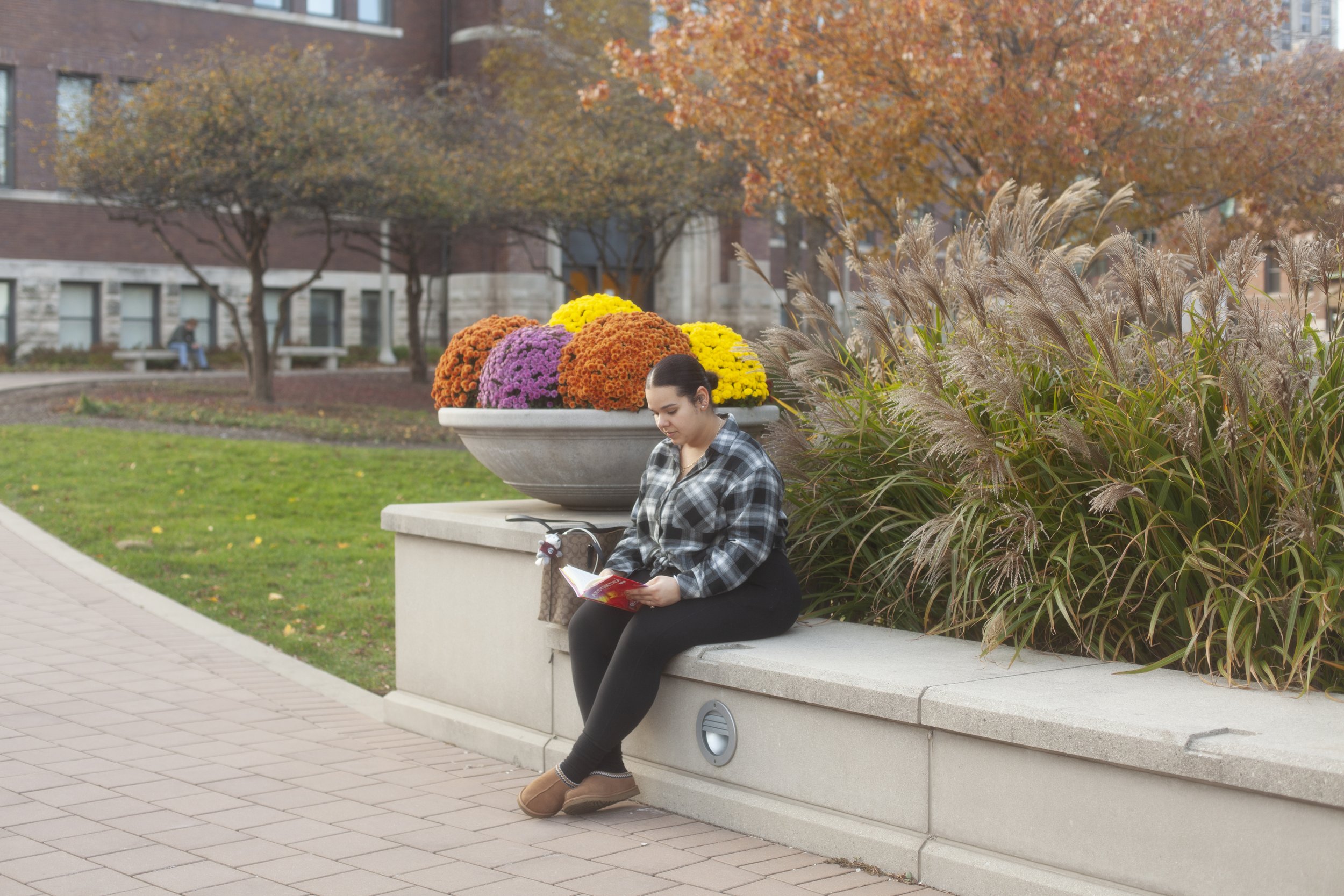
Celiana Luz López, 20, a student of Loyola University and member of Lambda Theta Alpha Latin Sorority Incorporated, spends time after class on campus. Chicago, IL, November 6, 2023 Photo by Samantha Friend Cabrera
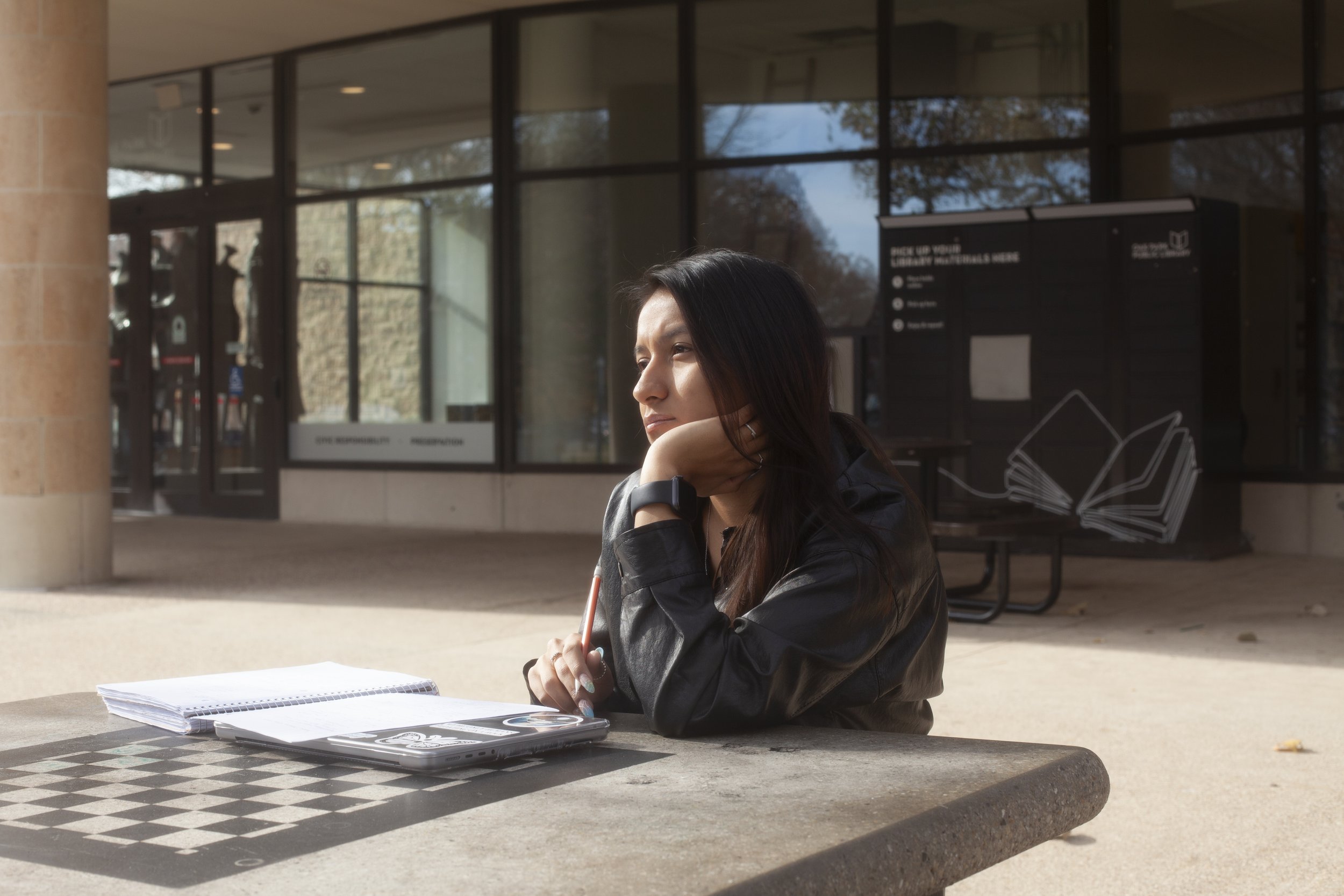
Gisselle Cambron, 20, is a psychology major on a premed track at Loyola University. She relaxes one morning before classes, posing in Oak Park, IL. November 16, 2023 Photo by Samantha Friend Cabrera
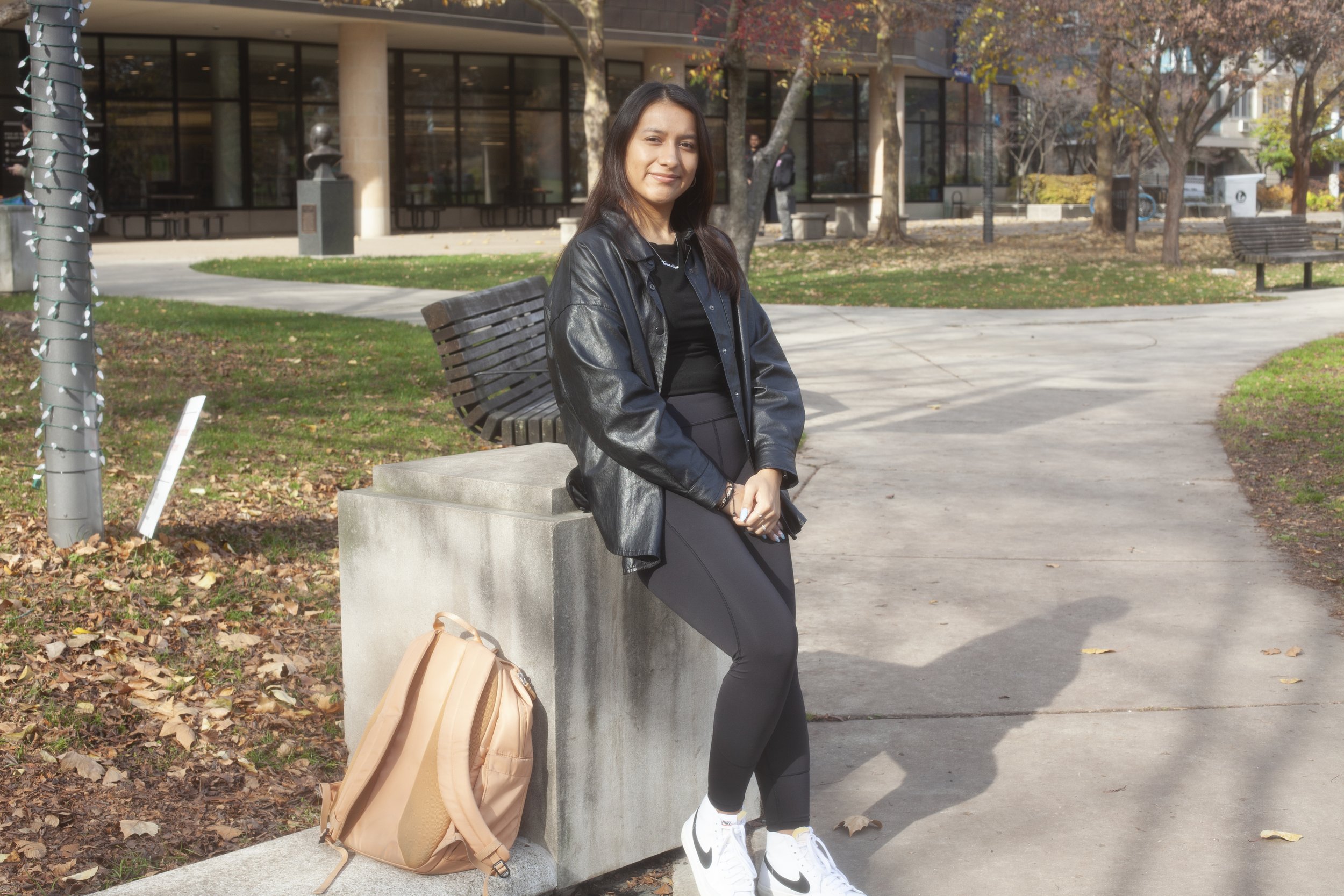
Gisselle Cambron, 20, a psychology major on a premed track at Loyola University, poses for a portrait before classes. Oak Park, IL, November 16, 2023 Photo by Samantha Friend Cabrera

Yamilette Rodriguez, 23, a senior at Loyola University, poses for a portrait at the Marcella Niehoff School of Nursing. Maywood, IL, November 21, 2023, Photo by Samantha Friend Cabrera

Yamilette Rodriguez, 23, a senior at Loyola University, poses for a portrait at the Marcella Niehoff School of Nursing. Maywood, IL, November 21, 2023, Photo by Samantha Friend Cabrera
Episode 9: Making Space for Queer Identity Through Art
Art has always been an important way for 20 year-old Kaelah Serrano to explore and express her queer identity. Born and raised on Chicago’s southwest side, Kaelah found an artistic home in Yollocalli Arts Reach, a nonprofit based in Little Village that provides arts, media, and storytelling education for young people—many of them Latinx—in Chicago. Yollocalli is an example of a crucial “third space”: a place separate from home and school where young people can socialize and learn.
In this episode, reporter Grace Del Vecchio follows Kaelah’s journey of self-discovery and explores how schools can better serve their Latinx LGBTQ+ students.

Kaelah Serrano, age 19, April 2023, on the opening night of the For Women, By Women Art Gallery exhibition, posing with her featured photographs. Photo by Grace Del Vecchio.

Kaelah Serrano, age 20, May 2023. at the National Museum of Mexican Art, standing next to Yollocalli Art Reach's collective artist statement. Photo by Grace Del Vecchio.

August Abitang, 24, works for the youth arts program known as Yollocalli. He poses for a portrait outside the Yollocalli space, where the org shares a community garden with the Boys & Girls Club of Chicago, and local Little Village neighborhood residents. Chicago, IL on August 31, 2023. Photo by Samantha Friend Cabrera
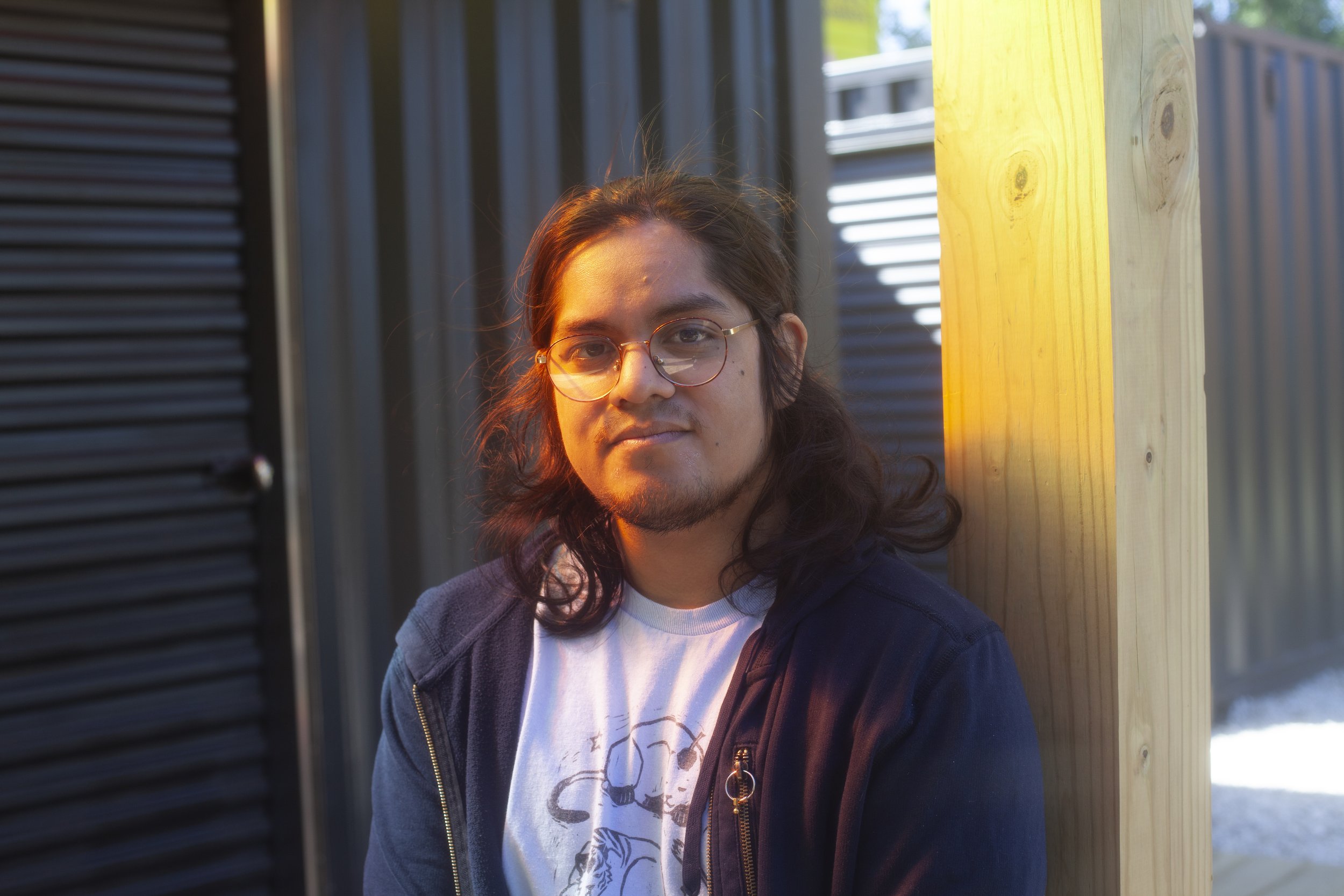
August Abitang, 24, works for the youth arts program known as Yollocalli. He poses for a portrait outside the Yollocalli space, where the org shares a community garden with the Boys & Girls Club of Chicago, and local Little Village neighborhood residents. Chicago, IL on August 31, 2023. Photo by Samantha Friend Cabrera
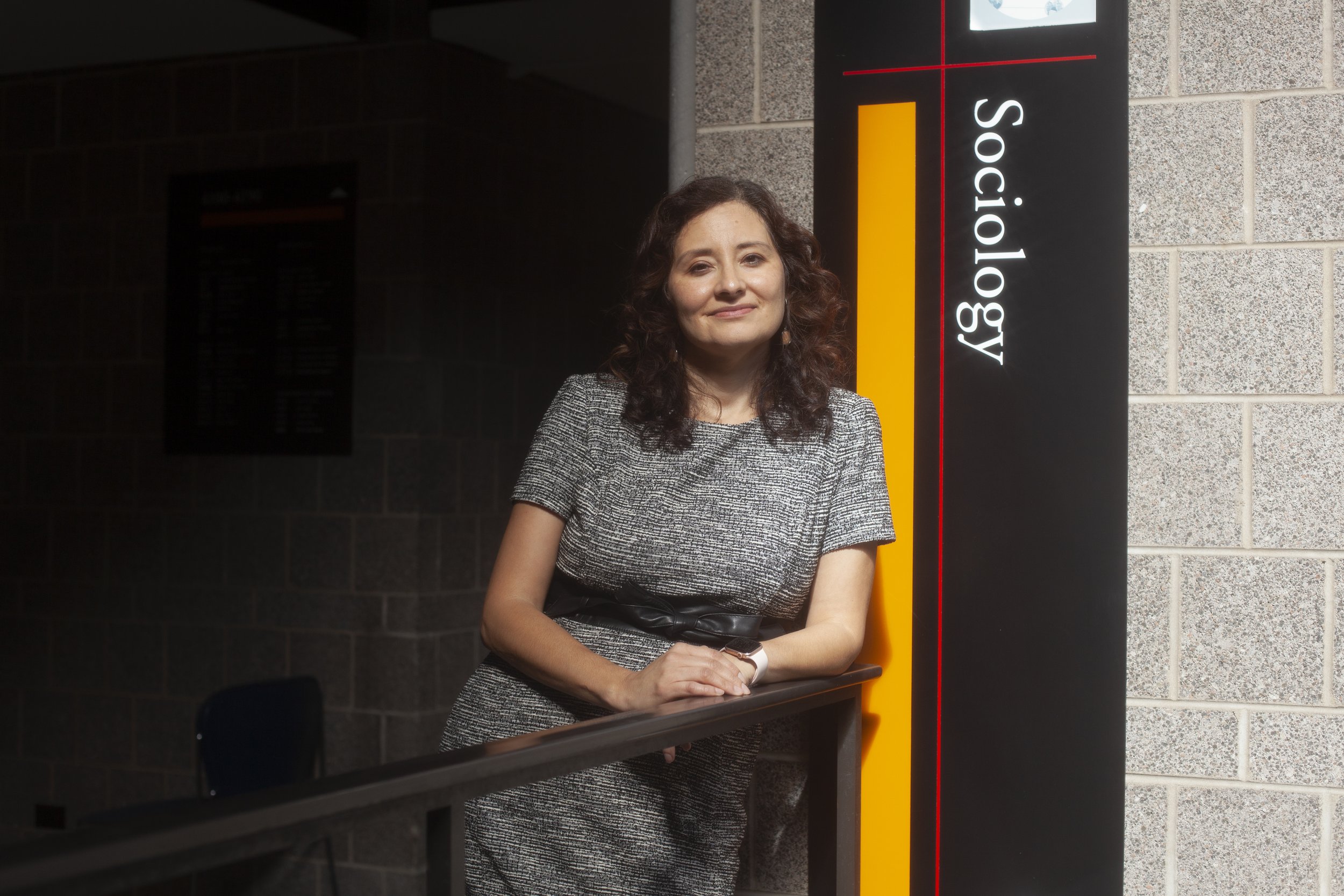
Dr. Lorena Garcia, 49, poses outside her work at the Sociology department at the University of Illinois Chicago. October 10, 2023 photo by Samantha Friend Cabrera
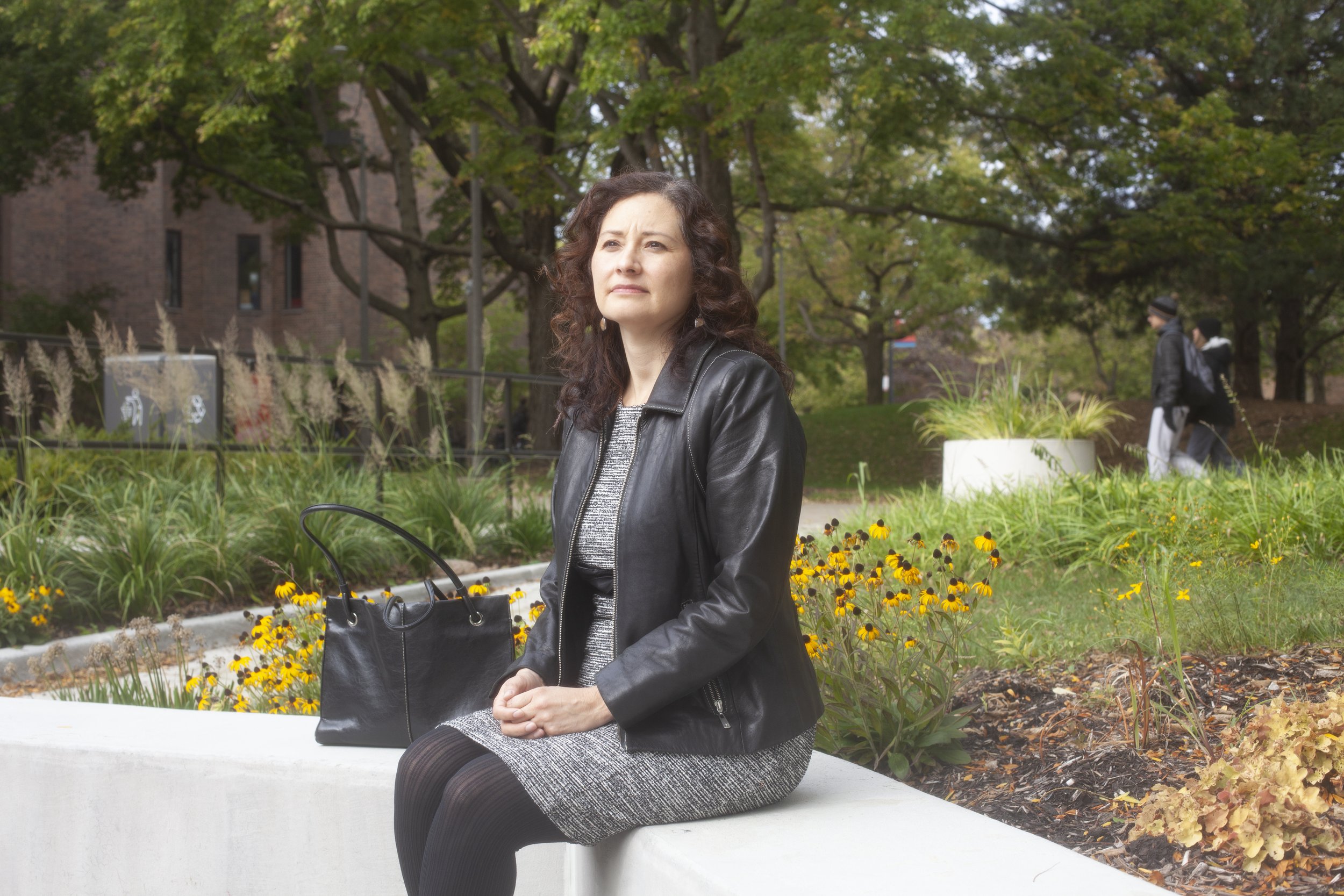
Dr. Lorena Garcia, 49, poses outside the Behavioral Sciences Building at the University of Illinois Chicago campus in Chicago, IL. October 10, 2023 photo by Samantha Friend Cabrera
Episode 8: What Happens When We Adultify Our Children
Dariana Urbina is just 17 years old, but she is responsible for far more than the average teenager. She takes care of her three younger siblings—budgeting, cooking and cleaning, and doing paperwork and translation for her parents, who work jobs with grueling hours. Dariana’s heightened burden of responsibility is an example of what experts call “adultification” or “parentification”, in which children are forced to take on the responsibilities of the adults, often due to their families’ socioeconomic status.
In this episode, reporter Brenda Ordoñez unpacks adultification’s causes and mental health impacts on children, and what can be done to protect and celebrate families instead.

The Urbina family (pictured left to right: Miguel, 40, Dariana, 17, Marianna, 3, Danilo, 6, Adriana, 38, and Angel, 14) dress in traditional Mexican clothing in celebration of Mexican Independence Day. They attend a Mexican Independence Day celebration at the Historic Woodstock Square in Woodstock, IL on September 17, 2023. Photo by Samantha Friend Cabrera
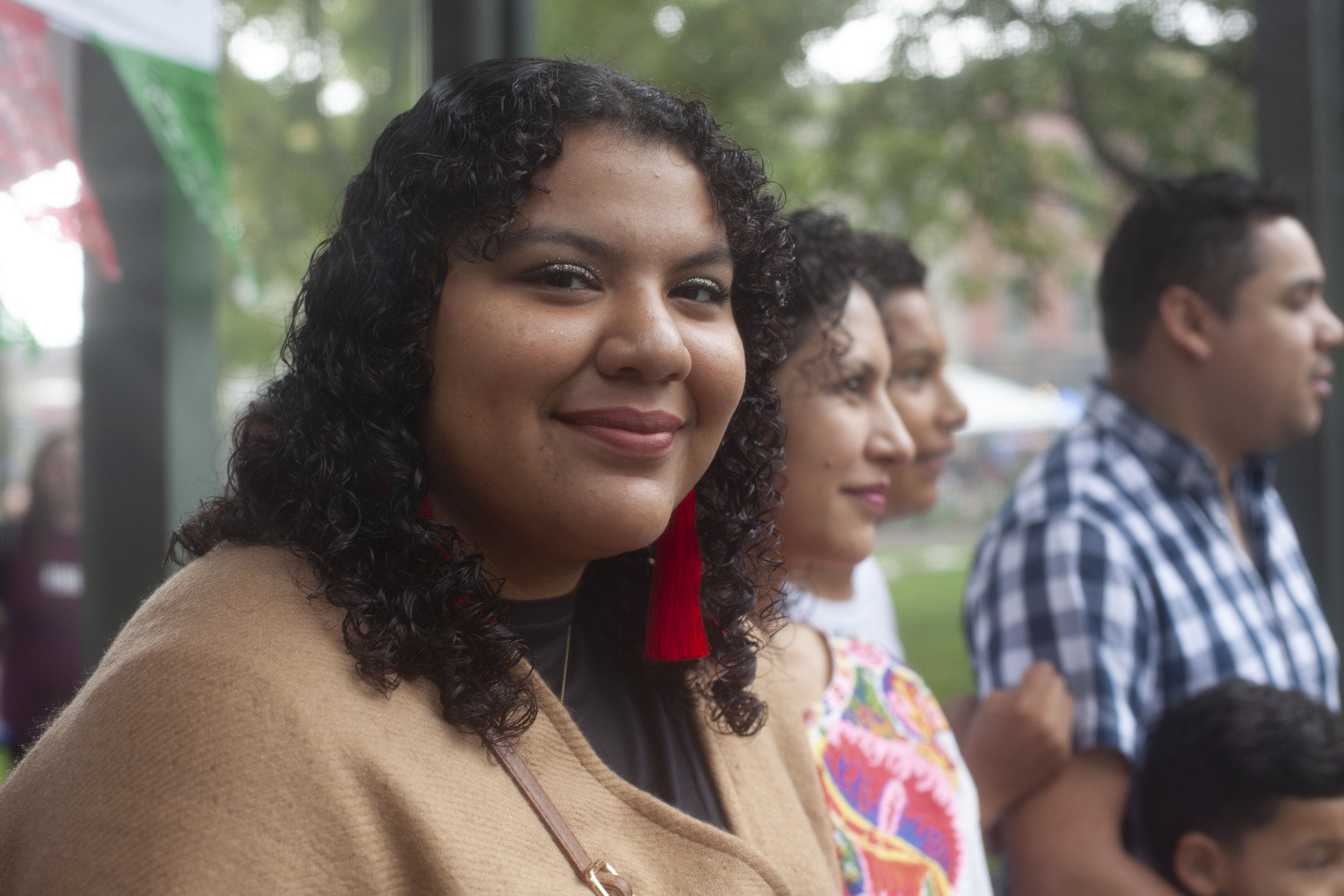
Dariana Urbina, 17 poses for a portrait while taking shelter with her family from heavy rains at the the Mexican Independence Day celebration in Woodstock, IL. September 17, 2023. Photo by Samantha Friend Cabrera

The Urbina family (pictured left to right: Dariana, 17, Adriana, 38, Angel, 14, Miguel, 40, and Danilo, 6) wait for the heavy rains to stop while in attendance at the the Mexican Independence Day celebration in Woodstock, IL. September 17, 2023. Photo by Samantha Friend Cabrera

Marilyn Rodriguez, 28, a mental health professional working for Latinx Talk Therapy, poses for a portrait in the garden of her old high school. She says North-Grand High School in Chicago, IL helped her shape the identity she holds today. August 31, 2023. Photo by Samantha Friend Cabrera

Pamela Fullerton, 40, is a mental health professional and entrepreneur who focuses on providing mental health services, particularly group therapy, for Latino and Black girls. She poses for a portrait at a park near her home in Morton Grove, IL on August 24, 2023. Photo by Samantha Friend Cabrera
Episode 7: Fighting For Safe Outdoor Play in Little Village
Nine year-old Rosalia Gonzalez and her teammates love playing flag football through Beyond the Ball Girls, a Little Village organization that teaches children life skills through sports. Safe outdoor recreation is especially important to the families in Little Village, a predominantly Latino neighborhood in Chicago impacted by higher rates of gun violence and gang activity compared to much of the city. Little Village also faces high rates of environmental pollution as a result of a coal plant and Target distribution center in the area.
In this episode, reporter Gina Castro investigates the intertwined issues facing the neighborhood, and meets the Little Village residents, activists, and community leaders working to make their neighborhood a safer place for children to play outdoors.
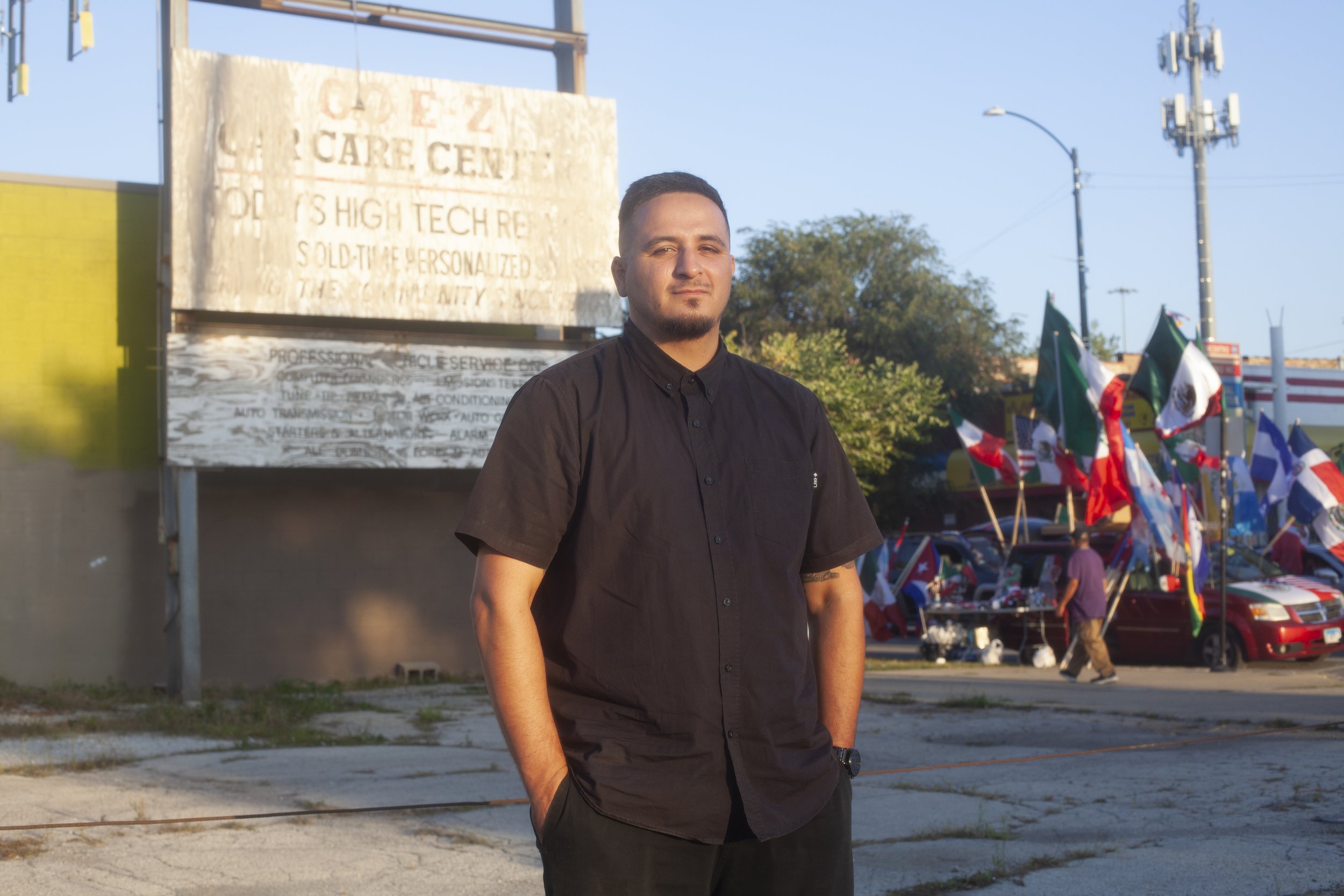
José Acosta-Córdova, 35, poses on 26th Street in Chicago, IL on the first day of Mexican Independence Day weekend. He poses in front of a scene of prideful cars drivng down the street in celebration of the holiday and their Latino heritage. Acosta-Córdova is the Senior Transportation Policy analyst at the Little Village Environmental Justice Organization whose offices are located nearby. September 15, 2023 photo by Samantha Friend Cabrera

José Acosta-Córdova, 35, poses outside of the offices of the Little Village Environmental Justice Organization where he works as a Senior Transportation Policy analyst. In the Little Village Neighborhood of Chicago, IL on September 15, 2023. Photo by Samantha Friend Cabrera
Episode 6: How to Support Kids Going Through Early Puberty
Andrea Luna Oviedo got her period for the first time in fourth grade, a year before her school district typically began puberty education for its students. She was able to tackle this new phase of her life with the help of supportive family and friends, and her school district in Berwyn, IL began teaching puberty education to fourth graders the year after.
Reporter Francesca Mathewes explores the increase in early puberty rates among most girls and some nonbinary and trans children, and unpacks the factors that could contribute to Latina girls experiencing early puberty at a higher rate than their white counterparts. Dr. Louise Greenspan, a pediatric oncologist, and health educators at Chicago Public Schools also explain how best to support children going through puberty earlier than their peers.
Episode 5: Reframing Healthy Food and Healthy Bodies
For Latina parents like Melissa Huerta in Berwyn, IL, providing her children with food that reflects her Mexican upbringing is a priority. But this objective is complicated by the relative convenience of processed foods, and her 9-year-old daughter’s preference for spaghetti and meatballs.
Reporter Julia Binswanger digs into the array of issues facing families looking to feed their children healthy and culturally significant foods, as well as the implications of new guidelines around childhood obesity. Leaders at organizations working to provide fresh produce and culturally specific food staples discuss their work in neighborhoods across Chicago, many of which are in food deserts.

Melissa Huerta, 37 and her daughter Alondra Huerta, 9, pose together at Manuel Perez Jr. Plaza, in Little Village, located just off the cultural corridor of 26th Street. September 8, 2023 in Chicago, IL. Photo by Samantha Friend Cabrera

Melissa Huerta, 37 and her daughter Alondra Huerta, 9, pose in their home neighborood, Little Village, on 26th Street. September 8, 2023 in Chicago, IL. Photo by Samantha Friend Cabrera

Melissa Huerta, 37 and her daughter Alondra Huerta, 9, read one of Alondra's school books, at Manuel Perez Jr. Plaza in their neighbohood of Little Village. September 8, 2023 in Chicago, IL. Photo by Samantha Friend Cabrera
Episode 4: Why How We Deal with Peripartum Depression Matters
High school teacher Itzel Carranza always knew she wanted to have a child, but difficulties arose along the way: from trouble conceiving and gestational diabetes to an intense labor experience and trouble breastfeeding. The anxiety Itzel felt was exacerbated by a cold Chicago winter, and she says she experienced postpartum depression for three months. While she was never officially diagnosed–about half of those suffering from it ever are–Itzel’s experience illustrates the pressures new moms face to be successful in their new roles.
Reporter Wendy Wei untangles the many physical and social factors that can contribute to this very common birth complication. And mental health workers and community healers share how Latinas can build the villages that can support them and their baby.

Itzel Carranza-Hegner, 40 plays with her daughter Kya Hegner, 4, in their backyard at their home in Glen Ellyn, IL on September 18. 2023. Photo by Samantha Friend Cabrera
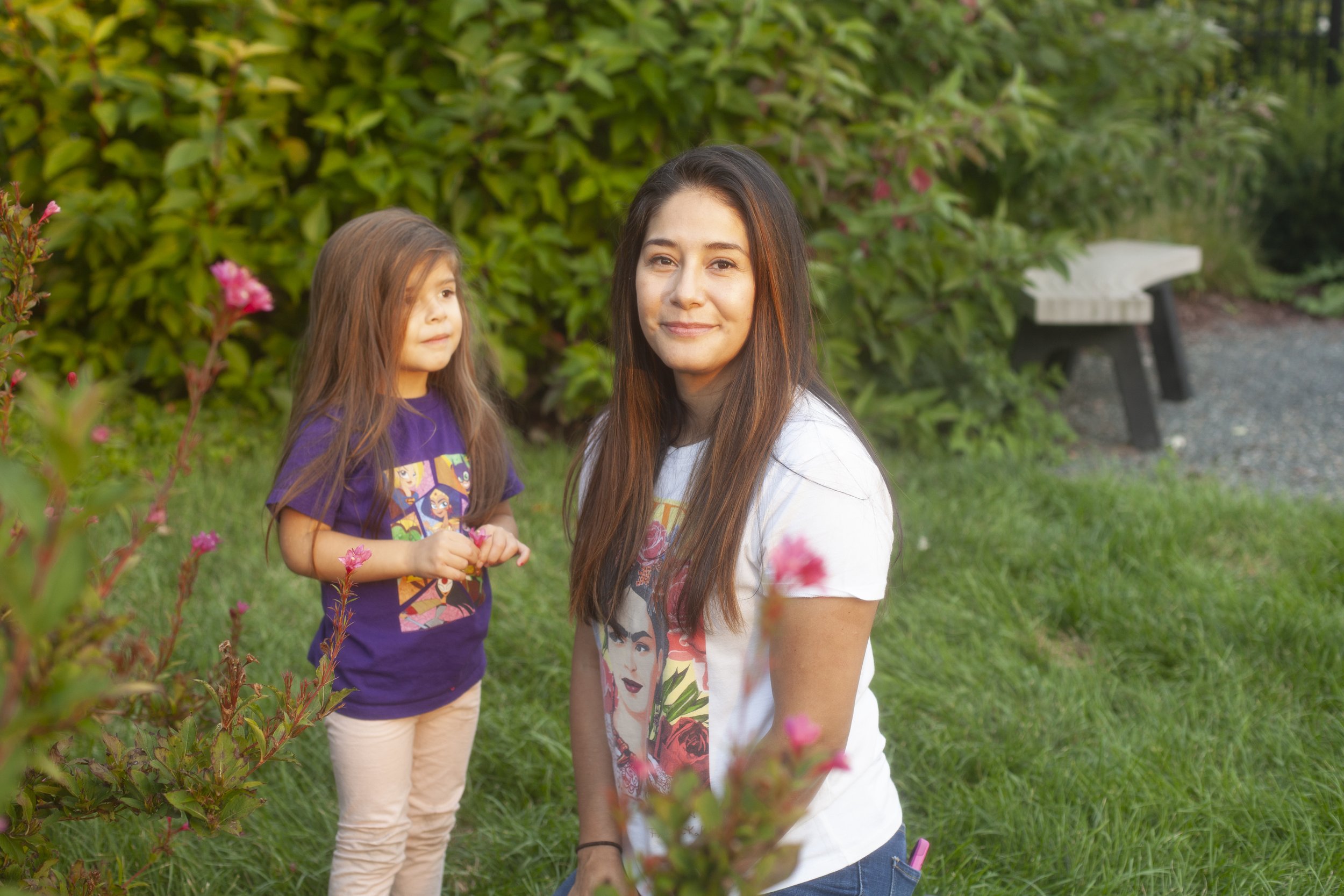
Itzel Carranza-Hegner, 40 poses with her daughter Kya, 4, in their backyard at their home in Glen Ellyn, IL on September 18. 2023. Photo by Samantha Friend Cabrera

Victoria, 68, who asked to be represented through photographs of her store, and to be photographed sparingly, sits at her spirtitual and religious goods store Botanica Victoria in Chicago, IL. The store is owned and operated by Victoria, who has been in this line of healing work for over 33 years. September 21, 2023 photograph by Samantha Friend Cabrera
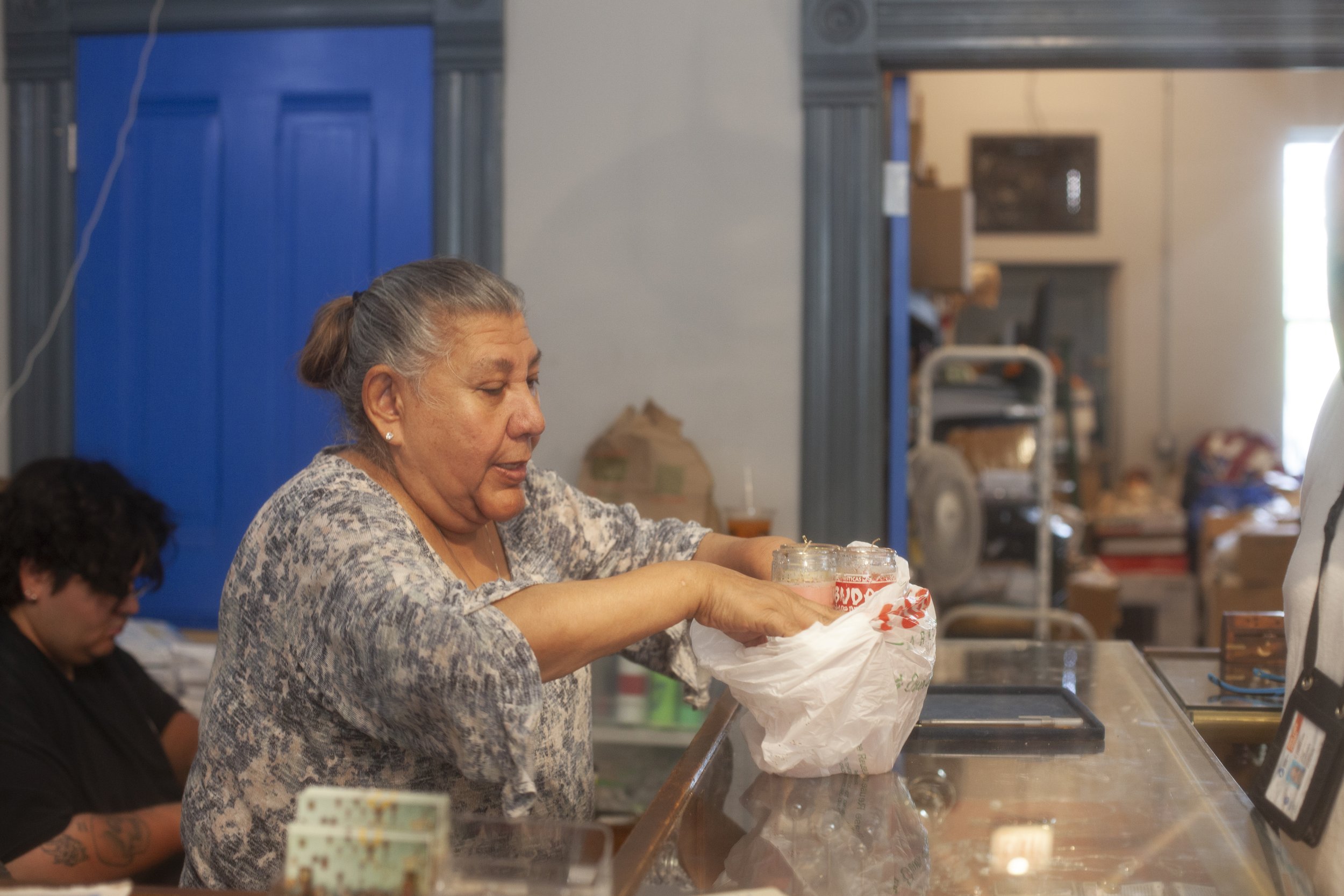
Victoria, 68 packs up candles at Botanica Victoria, her spirtitual and religious goods in Chicago, IL. The store is owned and operated by Victoria, who has been in this line of healing work for over 33 years. September 21, 2023 photograph by Samantha Friend Cabrera
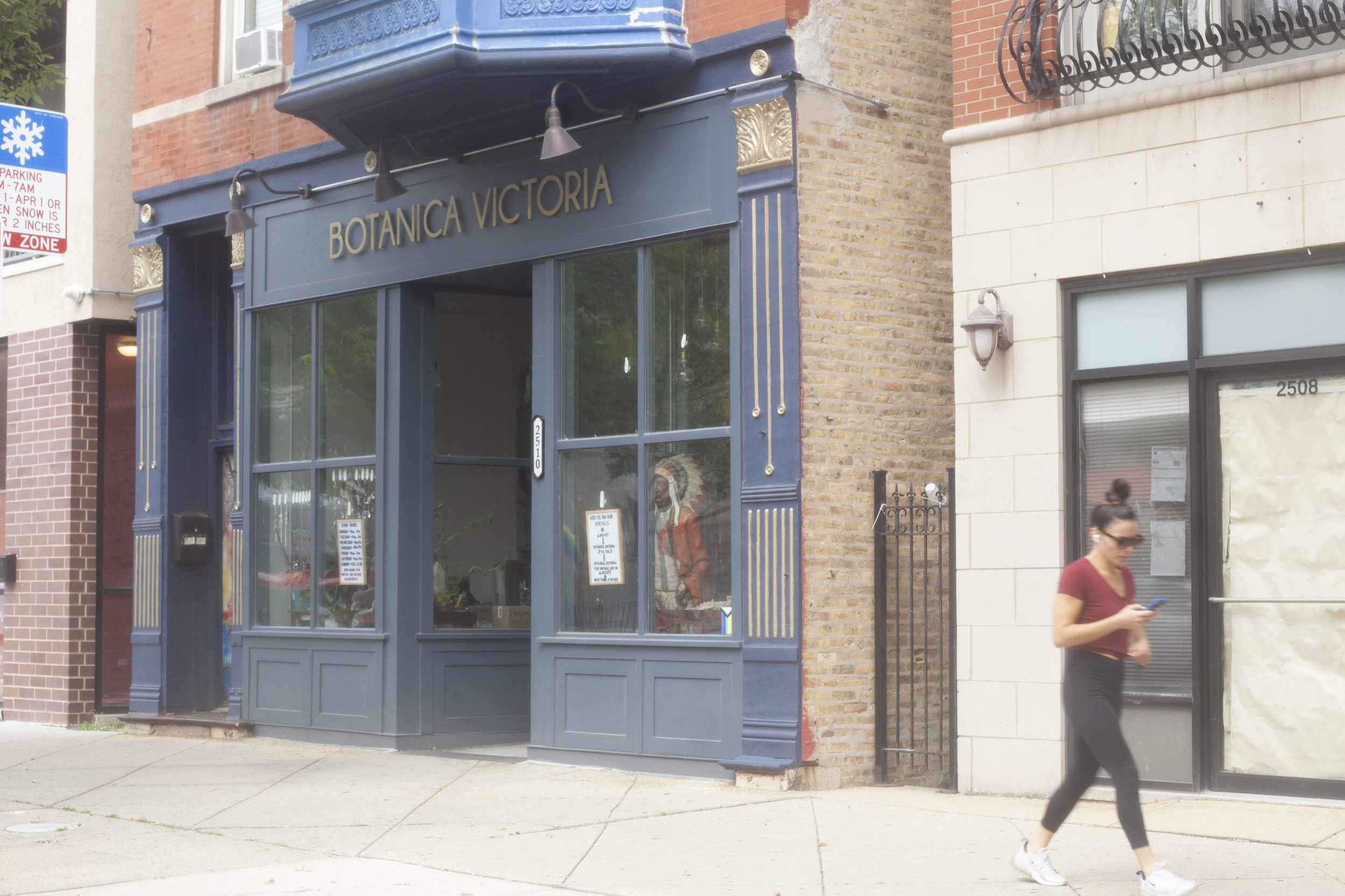
The exterior facade of Botanica Victoria, a religious and spiritual goods store near Humbolt Park in Chicago, IL. The store is owned and operated by Victoria, 68. September 21, 2023 photograph by Samantha Friend Cabrera
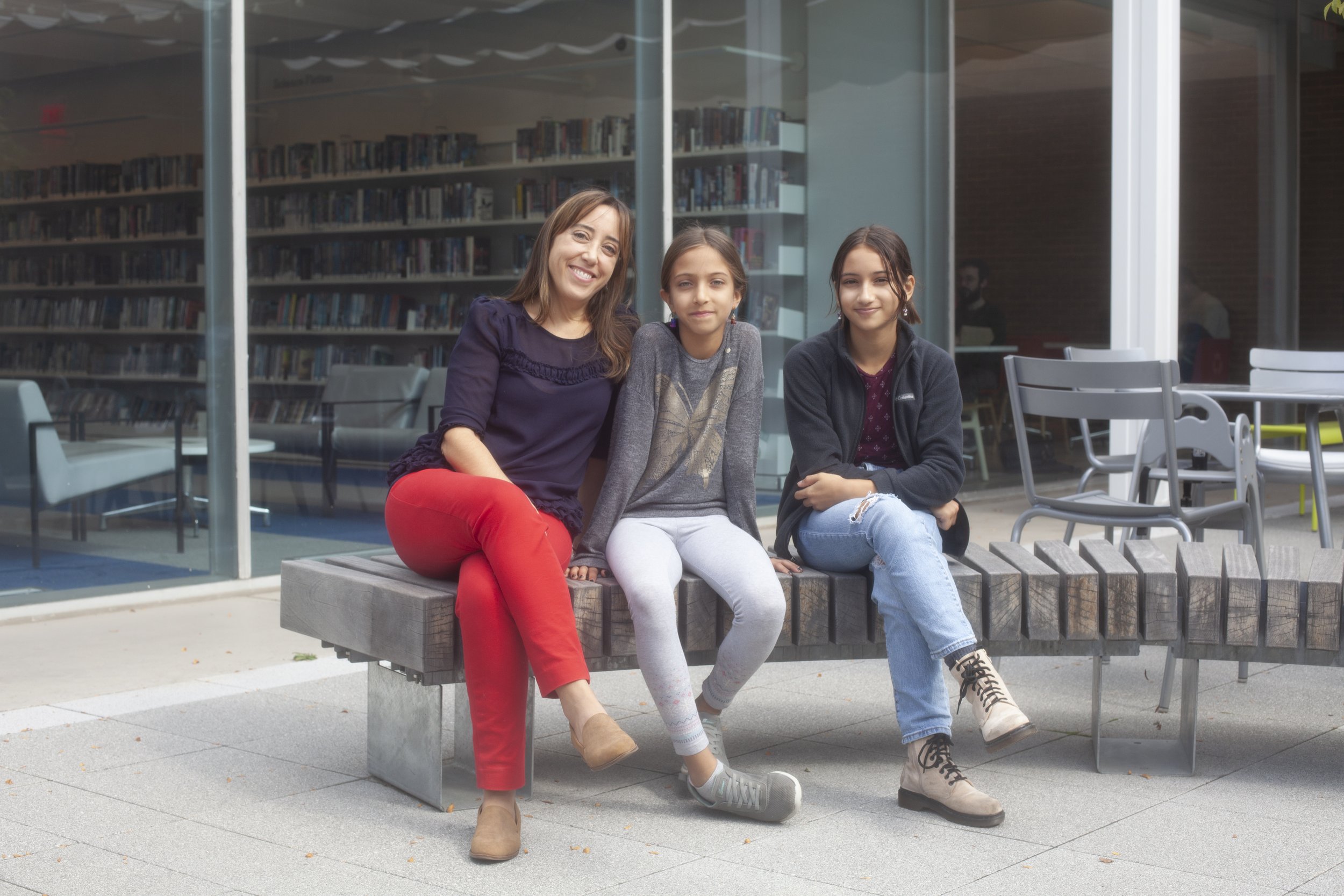
Raquel Galan, 44, poses for a portrait with her daughters Nora, 9, and Amaya, 11, at the Skokie Public Library on October 9, 2023. Photo by Samantha Friend Cabrera
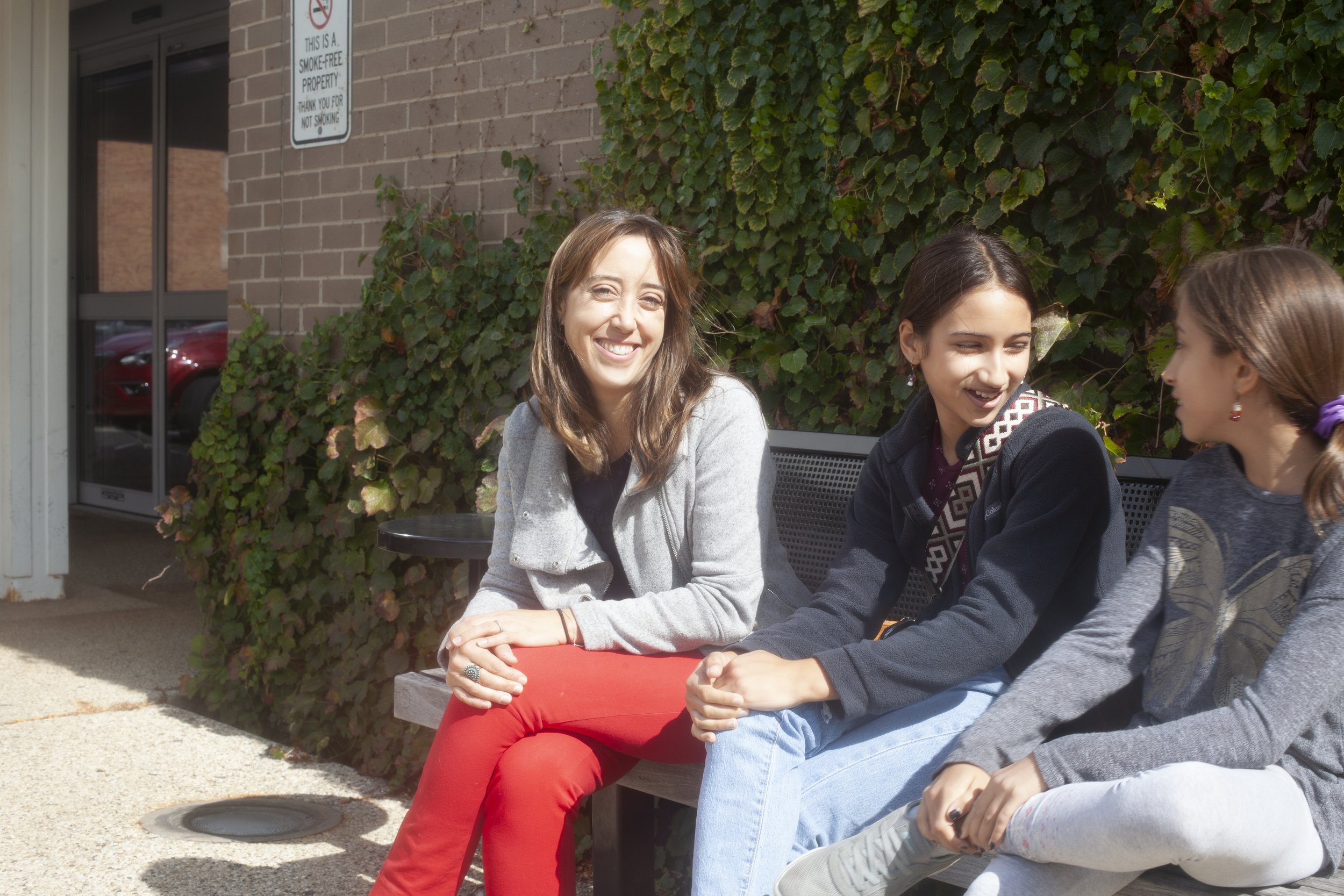
Raquel Galan, 44, poses for a portrait beside her daughters at the Skokie Public Library on October 9, 2023. Photo by Samantha Friend Cabrera
Episode 3: A Pandemic Pregnancy Story
Gina Ramirez learned she was pregnant in the fall of 2020, during the Covid-19 pandemic. Unable to practice social distancing due to her job, she came down with the virus when she was just two months pregnant. Like many Latinos in her neighborhood of Brighton Park in southwest Chicago, she had to navigate the anxiety and insecurity of not knowing how her job would support her while sick or pregnant, or how the virus would impact her pregnancy.
Reporter Francesca Mathewes revisits the crucial months that Latinos learned about the Covid-19 vaccine through the lens of Gina and her family. Local activists in Chicago shed light on the real fears and obstacles that fueled vaccine hesitancy, and illustrate how their focus on community health safeguarded the health and wellness of neighborhood residents and families like Gina’s.
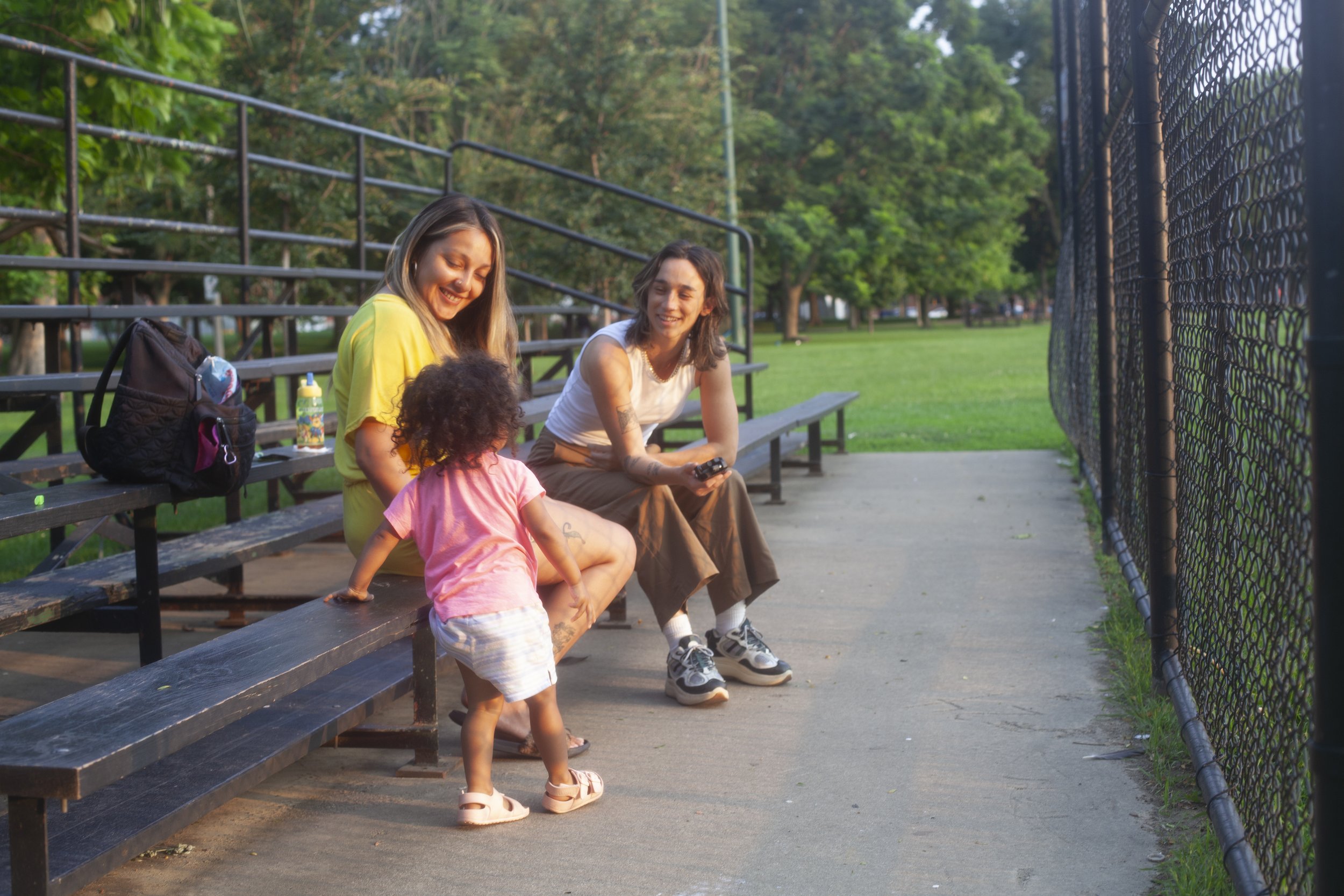
Gina Ramirez, 31, a first-time mom and her daughter Gianna, 2 take a break from an audio interview by reporter Francesca Mathews, 24 at McKinley Park in Chicago. July 31, 2023 Photo by Samantha Friend Cabrera
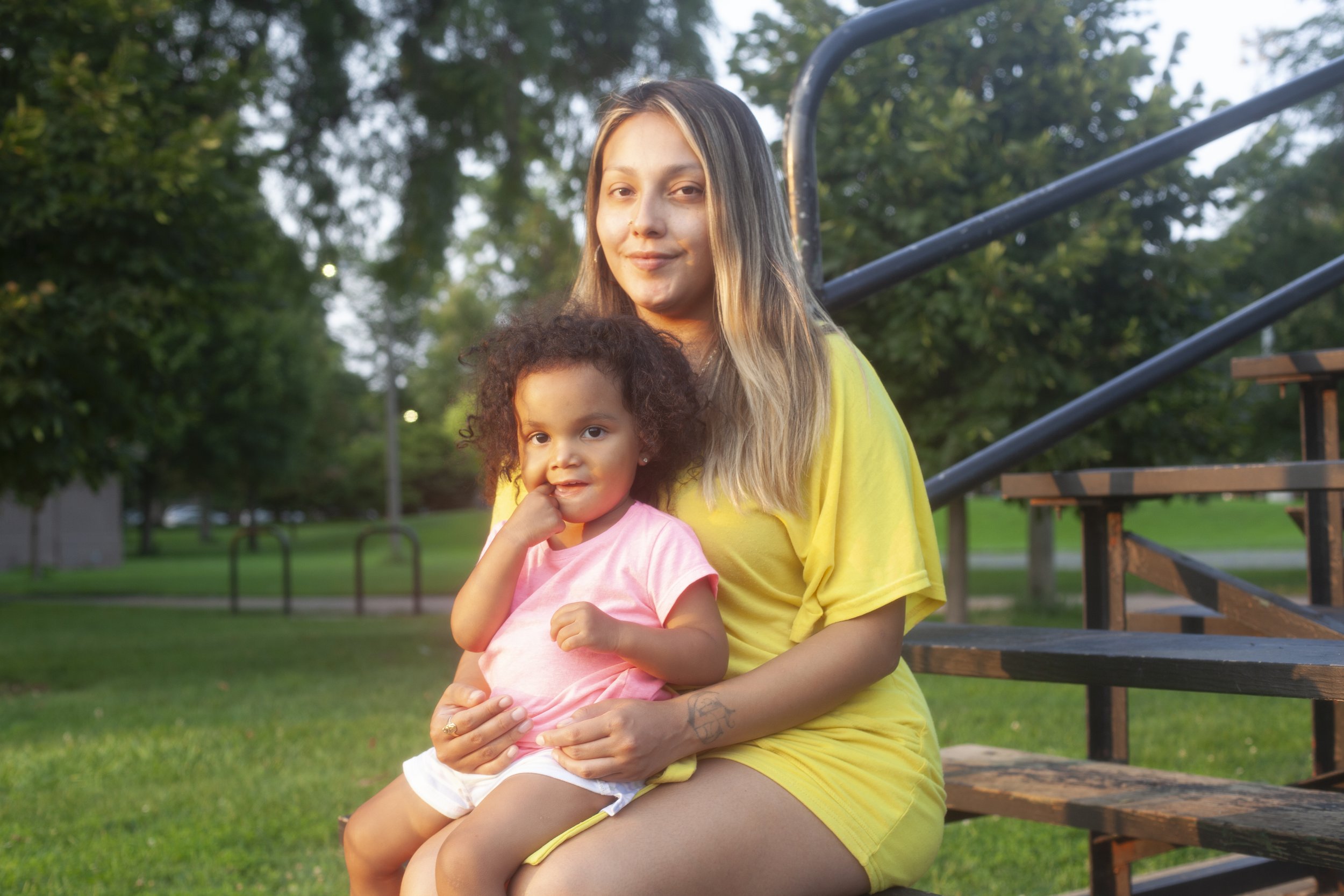
Gina Ramirez, 31, founder of Party Per Perpose, a community organization in Brighton Park, plays with her daughter Gianna, 2, at McKinley Park in Chicago. July 31, 2023 Photo by Samantha Friend Cabrera

Gina Ramirez, 31, founder of Party Per Perpose, a first-time mom, poses with her daughter Gianna, 2, at sunset. McKinley Park in Chicago on July 31, 2023. Photo by Samantha Friend Cabrera
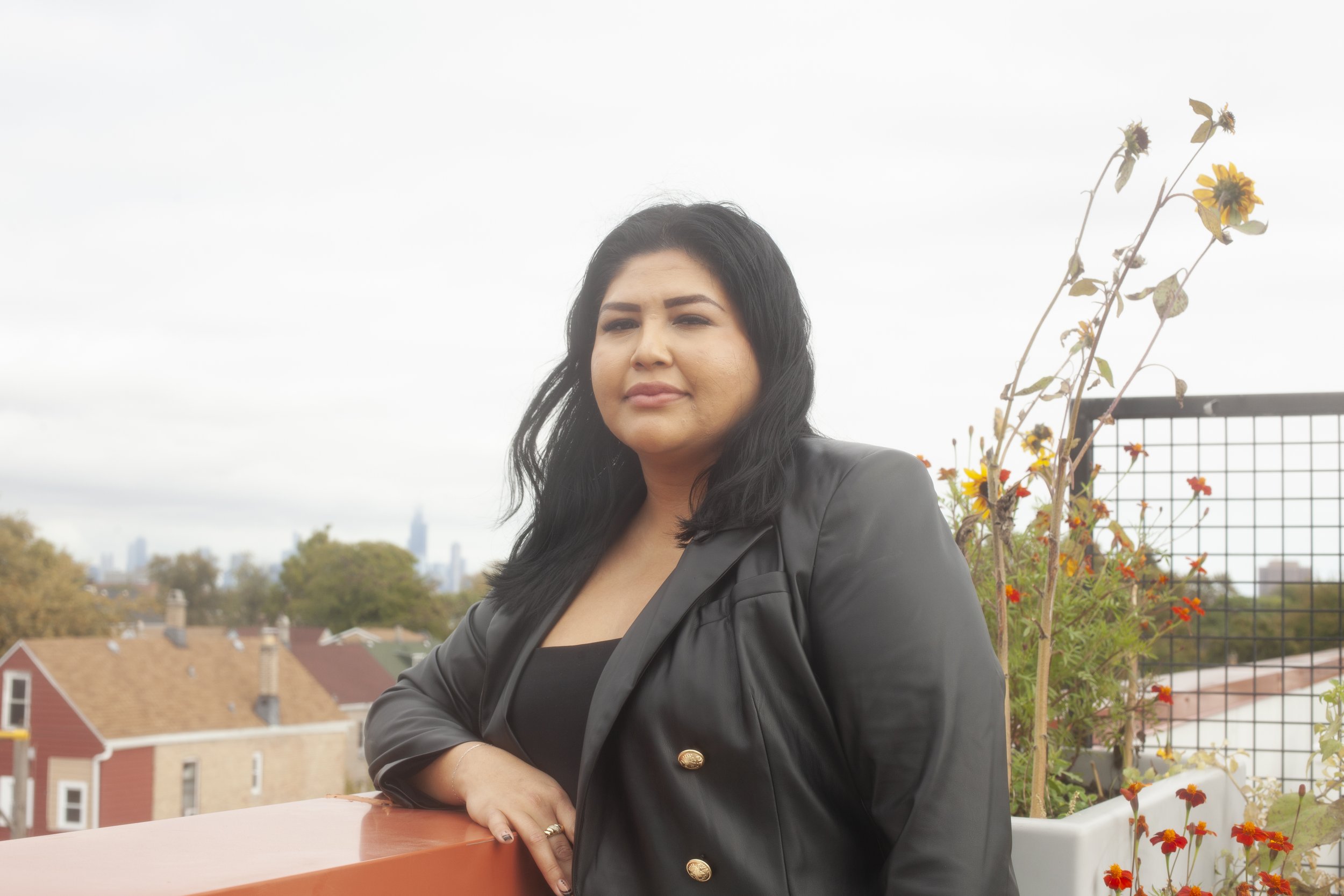
Jadhira Sanchez Zaragoza, 33, poses at the newly renovated Enlace building located in the Little Village neighborhood of Chicago, IL, where Sanchez Zaragoza has worked for the past three years. October 12, 2023 photo by Samantha Friend Cabrera
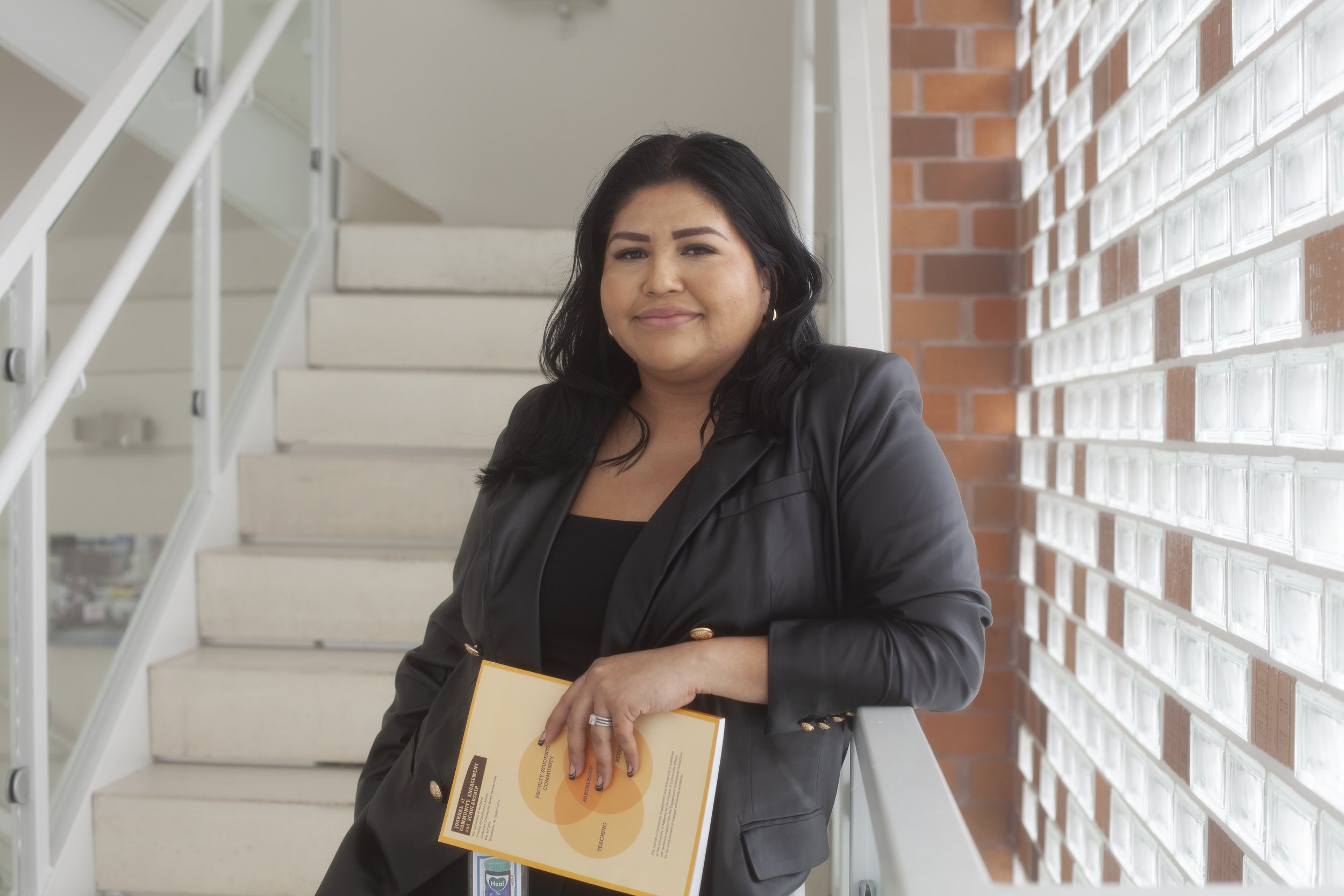
Jadhira Sanchez Zaragoza, 33, poses inside the newly renovated Enlace building located in the Little Village neighborhood of Chicago, IL, where Sanchez Zaragoza has worked for the past three years. October 12, 2023 photo by Samantha Friend Cabrera
Episode 2: Why We Must Talk About Pregnancy Loss
Many of us think miscarriages are rare, but at least 1 in 3 Latinas in the U.S. experience them. Mayra Buitrón is a birth and bereavement doula in Chicago–a health worker who helps parents navigate the physical and emotional fall-out of pregnancy loss. She lost a pregnancy in the past, and experienced the shame and silence that makes it hard to talk about it openly; a stigma that has only increased with the crackdown on the use of abortion pills, a crucial miscarriage management tool.
Reporter Leslie Hurtado accompanies Latina birth workers who themselves miscarried as they share the importance of seeking both physical and emotional care in the aftermath of pregnancy loss..

Nurse practitioner Claudia Whitaker-Carr, 58 poses for a portrait at Techny Prairie Park in Northbrook, IL. The park is local to her and holds memories of where her children used to play and hold sports games. September 18, 2023 photo by Samantha Friend Cabrera
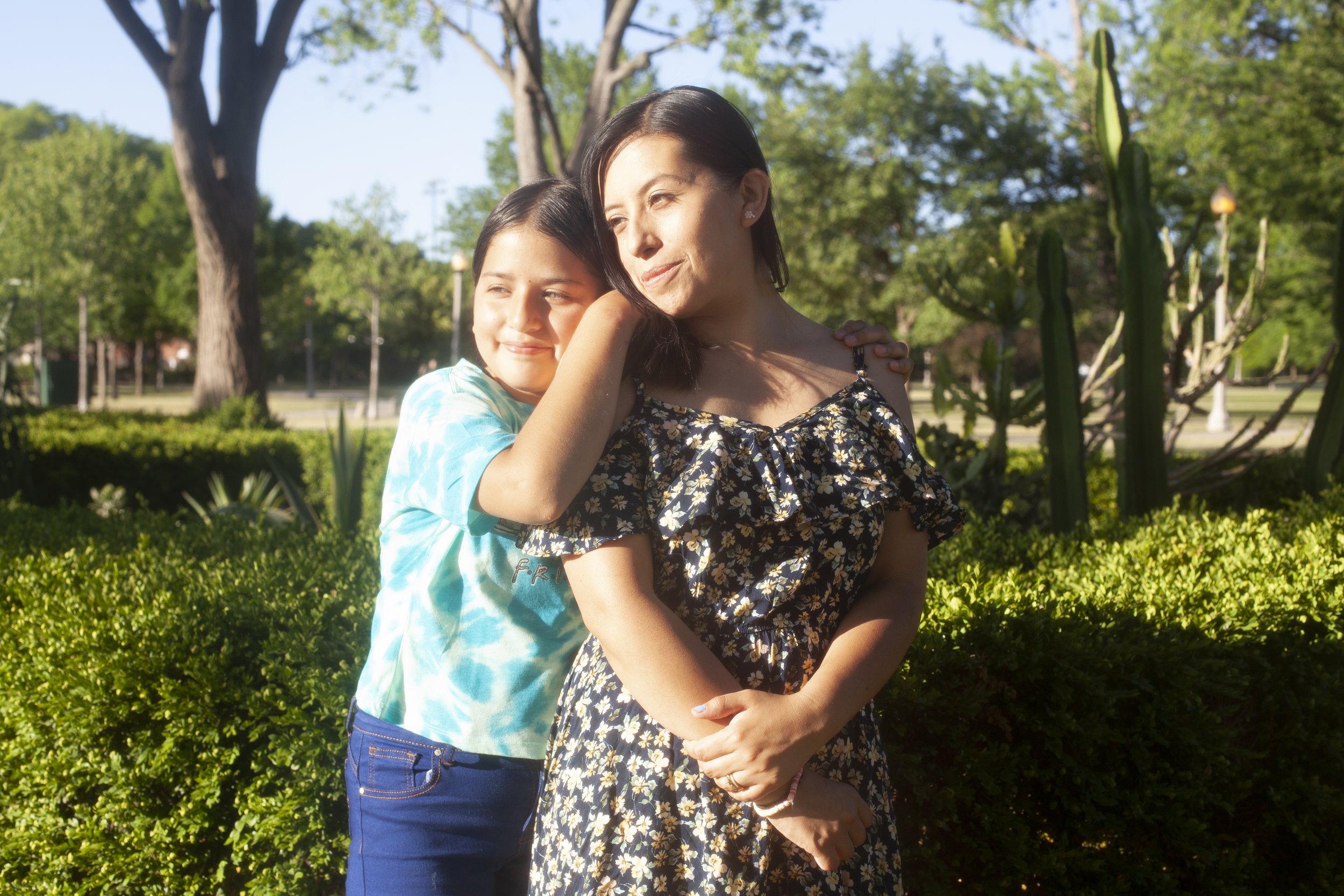
Doula and mother, Mayra Elisa Buitrón, 32, (33rd birthday in July) poses with her daughter Flor Milena Buitrón, 10, pose at Portage Park in Chicago, IL on June 23, 2023. Photo by Samantha Friend Cabrera

Mayra Elisa Buitrón, 32, (33rd birthday in July) poses at Portage Park in Chicago, IL on June 23, 2023. Photo by Samantha Friend Cabrera
Episode 1: The Myths and Gifts of Bilingualism in Babies
New parents Wendy Miralda and José Paz are navigating the first year of their daughter Jelyani’s life, in Spanish. Language is key to their connection as a family and as Hondurans living in a predominantly Mexican neighborhood in Waukegan, Illinois. The Paz family never questioned teaching their baby Spanish. But many Latinos in the U.S. grapple with the misconception that doing so could delay their child learning English, or affect their development. There’s also the stigma Latinos face when they don’t teach their children Spanish.
Reporter Andrea Flores dives into the research on infant brain development that supports bilingualism, and tackles the harmful misconceptions that divide U.S. Latinos along language lines.

The Paz family, Jose Paz, 28 and Wendy Miralda, 27, hold their ten-month-old daughter Jelyani Paz inside of their family home in Waukegan, IL on May 23, 2023. Photo by Samantha Friend Cabrera
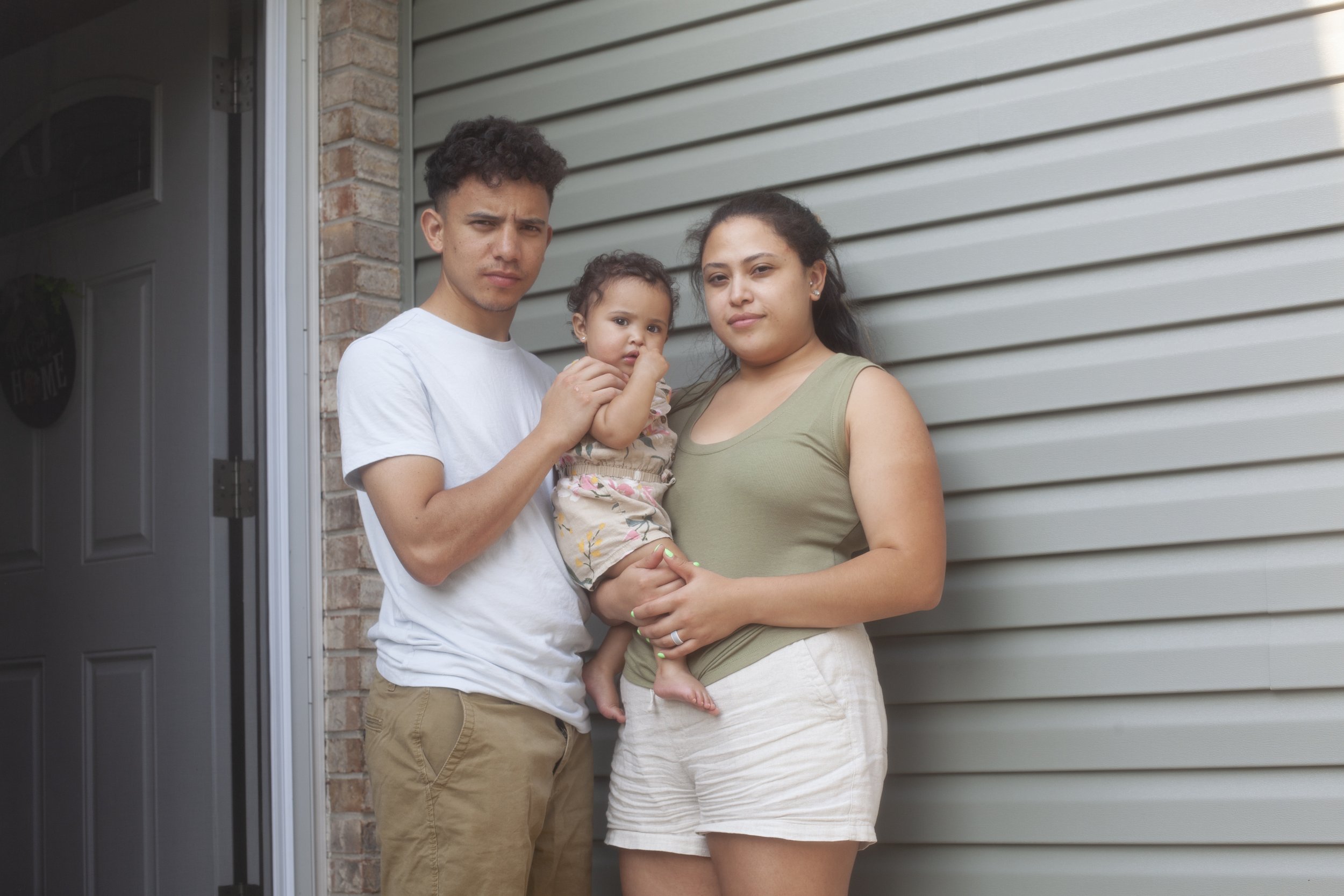
The Paz family, Jose Paz, 28 and Wendy Miralda, 27, hold their ten-month-old daughter Jelyani Paz outside of their family home in Waukegan, IL on May 23, 2023. Photo by Samantha Friend Cabrera
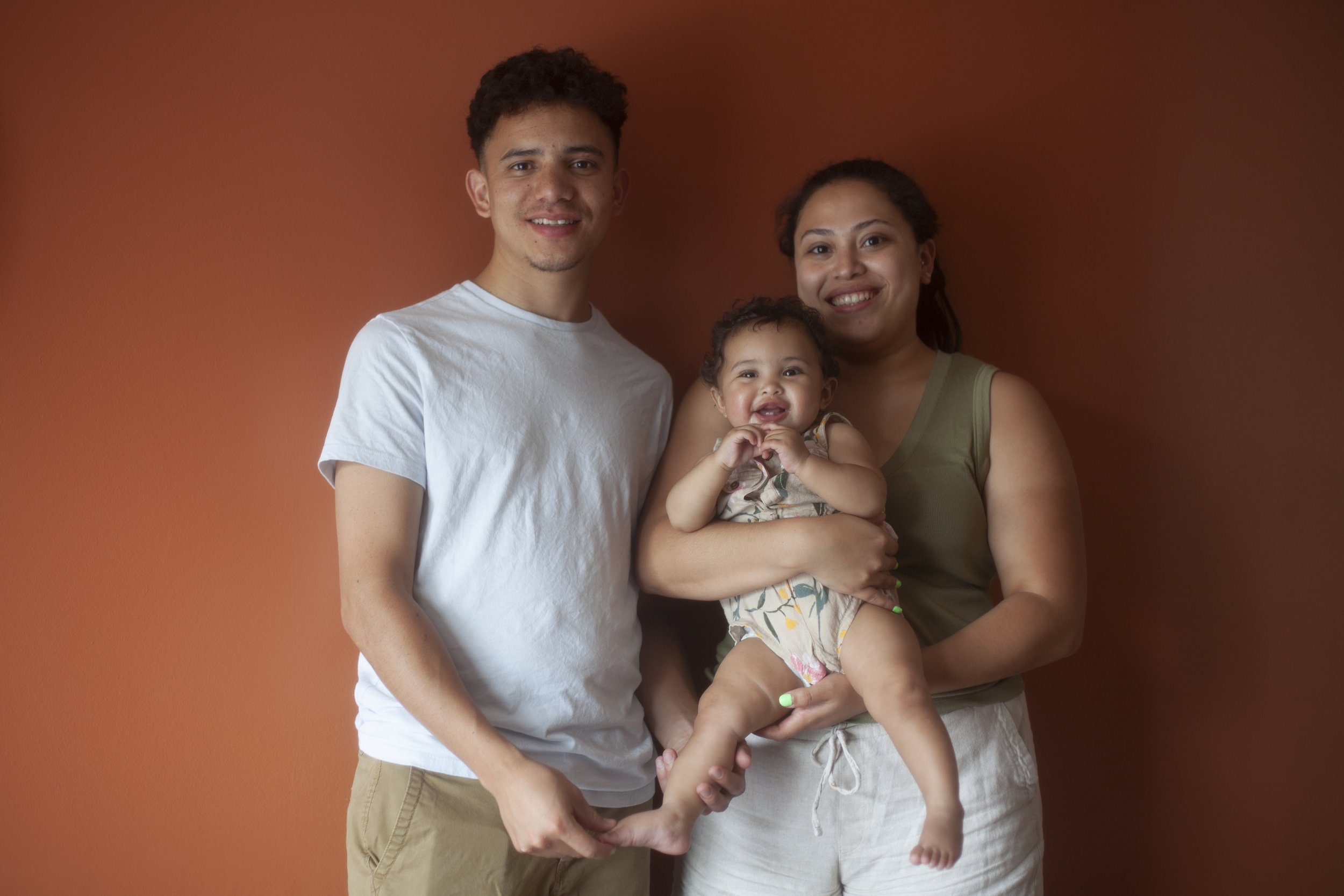
The Paz family, Jose Paz, 28 and Wendy Miralda, 27, hold their ten-month-old daughter Jelyani Paz inside of their family home in Waukegan, IL on May 23, 2023. Photo by Samantha Friend Cabrera

Wendy Miralda, 27, with her ten month old daughter Jelyani Paz is interviewed by is interviewed by reporter Andrea Flores, 27, inside of her home in Waukegan, IL on May 23, 2023. Photo by Samantha Friend Cabrera

Adriana Weisleder, 40, poses outside of her office at Northwestern University on May 23, 2023. Photo by Samantha Friend Cabrera
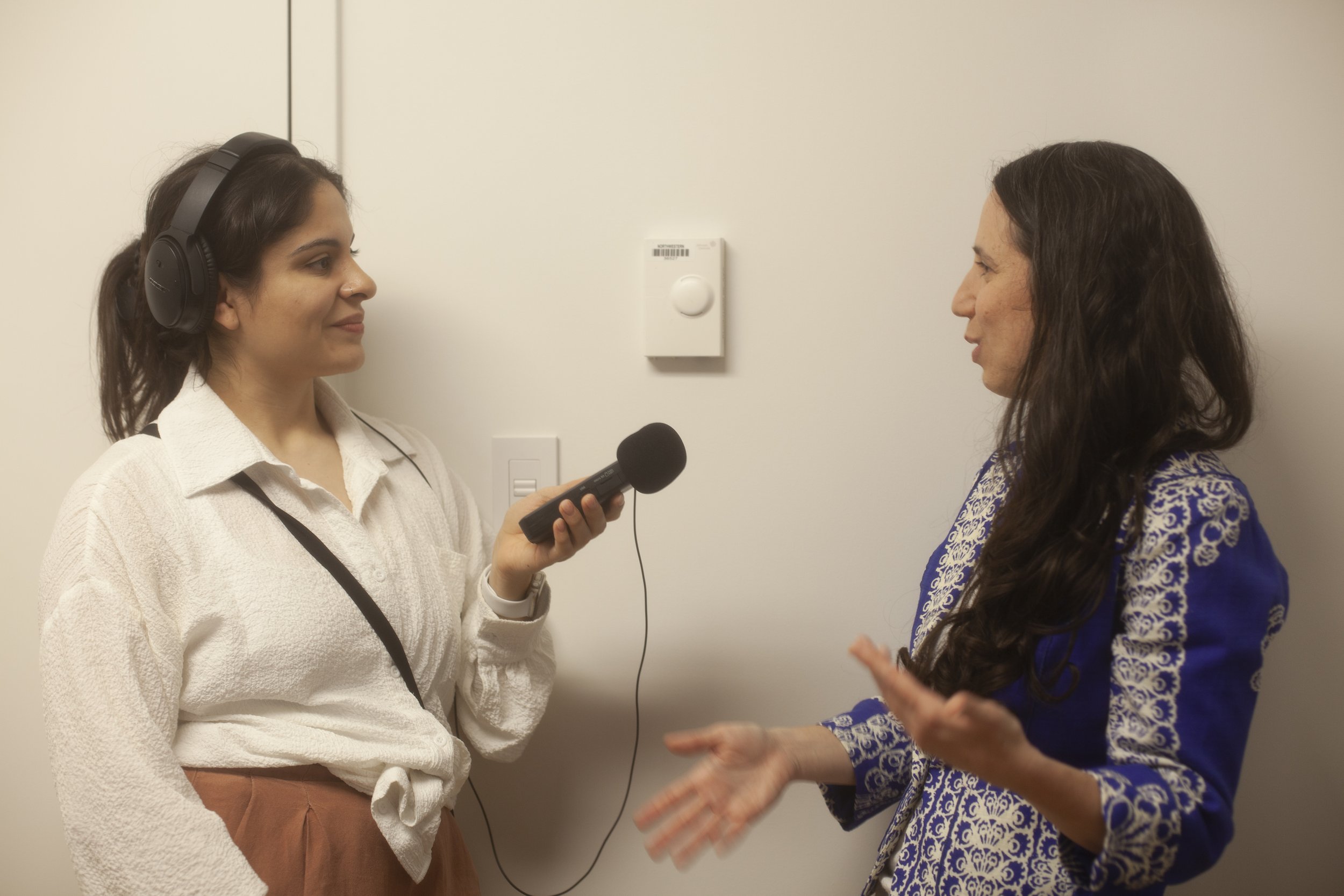
Adriana Weisleder, 40, is interviewed by reporter Andrea Flores, 27, outside of her department office at Northwestern University on May 23, 2023. Photo by Samantha Friend Cabrera
